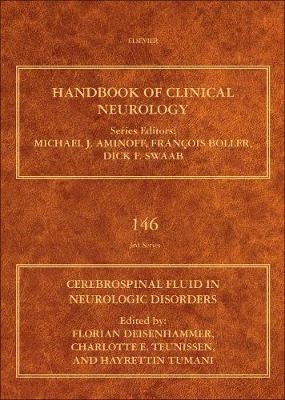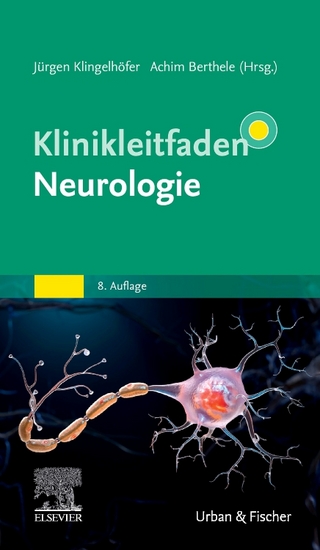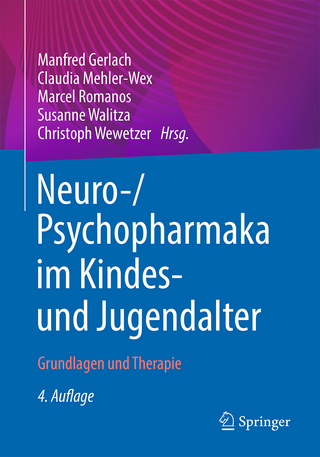
Cerebrospinal Fluid in Neurologic Disorders
Elsevier Science Publishing Co Inc (Verlag)
978-0-12-804279-3 (ISBN)
Finally, the book provides an outlook for potential directions that can be explored to improve the various aspects of CSF research with the ultimate goal of being incorporated in clinical practice.
Florian Deisenhammer is presently Professor of Neurology at the University of Innsbruck in Austria. After graduating in 1989 from the University of Vienna Medical School, he finished training in clinical Neurology at Innsbruck Medical University in 1996 and became senior staff member since then. He is director of the neuroimmunological laboratory and his clinical work focuses on stroke and neuroimmunology, particularly multiple sclerosis. His main scientific interest is MS therapy monitoring, specifically antibodies against interferons and other biomarkers in CSF and blood. He issued guideline papers on CSF and led a workpackage in an EU project on interferon antibodies (NABINMS) and he is currently involved in a broader EU project on immunogenicity of biopharmaceuticals in general (ABIRISK). He received several prices for his scientific work. He is a member of various international and national societies including the Austrian Medical Society, the International Society of Neuroimmunology, the EFNS task force on beta interferon neutralizing antibodies, board member of the German society of neurochemistry and CSF diagnostics, the task force on CSF, and member of the editorial board of the Journal Multiple Sclerosis and Related Disorders (MSARD). Charlotte Teunissen’s research mission is to cure dementia disorders through development of body fluid biomarkers. The studies of her research group cover the entire spectrum of biomarker development. The studies start with biomarker identification, hypothesis based as well as by mass spectrometry based proteomics method, including mass spectrometry and aptamer-based proteomics technologies. The group puts strong effort in analytical validation of the most promising biomarkers by available immunoassays, which we also develop ourselves. In the next step, extensive internal and external clinical validation are performed and the last type of studies are aimed at implementation of novel biomarkers in clinical practice. The lab possesses state of the art technologies, such as SOMAscan, Quanterix ultrasensitive SimOA technology, Mesoscale technology and in vitro technologies for clinical routine lab analysis. These studies are all based on the availability of a well-characterised biobank, headed by me, of >4000 paired CSF and serum samples of dementia patients (a.o. Alzheimer, Frontotemporal, Lewy Bodies) and controls with subjective complaints, that visit the Alzheimer Center Amsterdam outpatient clinic. To ensure the quality of biosamples, Teunissen performs scientific studies to detect e.g. sentinel biomarkers, and take the lead in guideline development for CSF biomarker study methodology. Teunissen has always collaborated strongly in the field, as this is a prerequisite for performing high quality biomarker studies, visible in her lead in the BioMS network, the Society for Neurochemistry and routine CSF analysis, and the Alzheimer Association-global biomarker standardization consortium. Dr. Tumani received his medical degree from the University of Göttingen/Germany in 1991. He received Board certification in Neurology in 1999, and completed his professorship thesis in 2001 on the topic “physiology and clinical relevance of brain-specific proteins in CSF. Dr. Tumani is Professor of Neurology and Director of Multiple Sclerosis Center at the Dept. of Neurology of the University School of Medicine, in Ulm/Germany. He is also the Director of the CSF laboratory, and past President of the “German Society of CSF analysis and clinical neurochemistry (DGLN). Since 2015, he is also Chief of the Clinic of Neurology Dietenbronn in Schwendi/Germany specialized for diagnostics and treatment of neuroinflammatory and neurodegenerative disorders. Dr. Tumani has published over 200 peer-reviewed original papers and over 20 book chapters, and he is a reviewer for several journals and research funding agencies. His scientific areas of interest include diagnostic and prognostic biomarkers in neuroinflammatory as well as neurodegenerative diseases. Dr. Tumani has served as principal investigator on several multi-center clinical trials. Dr. Tumani’s research has been funded by the Hertie-Foundation, German Research Foundation (DFG), Federal Ministry of Education and Research (BMBF), Faculty of University of Ulm, Polyradikulitis-Stiftung, and the pharmaceutical industry. Affiliations and Expertise: Department of Neurology, University of Ulm, Germany
Section I. General Aspects 1. The use of cerebrospinal fluid in biomarker studies 2. The cerebrospinal fluid and barriers – anatomical and physiological considerations 3. More than a drainage fluid: the role of CSF in signalling in the brain and other effects on brain tissue 4. Dosing, collection and quality control issues in cerebrospinal fluid research using animal models
Section II. CSF Research in Particular Disease Entities and its Clinical Context 5. Multiple sclerosis, and other demyelinating and autoimmune inflammatory diseases of the central nervous system 6. Cerebrospinal fluid in the dementias 7. Biomarkers in cerebrospinal fluid for synucleinopathies, tauopathies, and other neurodegenerative disorders 8. Cerebrospinal fluid in Creutzfeld-Jakob disease 9. Cerebrospinal fluid findings in Guillain-Barré syndrome and chronic inflammatory demyelinating polyneuropathies 10. Cerebrospinal fluid biomarkers of malignancies located in the central nervous system 11. Impaired cerebrospinal fluid pressure 12. Cerebrospinal fluid in acute and chronic infectious diseases 13. Vascular diseases and bleedings 14. Cerebrospinal fluid and brain extracellular fluid in severe brain trauma 15. Epilepsy 16. Primary headaches 17. Psychiatric syndromes other than dementia
| Erscheinungsdatum | 01.12.2017 |
|---|---|
| Reihe/Serie | Handbook of Clinical Neurology |
| Sprache | englisch |
| Maße | 195 x 260 mm |
| Gewicht | 900 g |
| Themenwelt | Medizin / Pharmazie ► Medizinische Fachgebiete ► Neurologie |
| Naturwissenschaften ► Biologie ► Humanbiologie | |
| Naturwissenschaften ► Biologie ► Zoologie | |
| ISBN-10 | 0-12-804279-6 / 0128042796 |
| ISBN-13 | 978-0-12-804279-3 / 9780128042793 |
| Zustand | Neuware |
| Informationen gemäß Produktsicherheitsverordnung (GPSR) | |
| Haben Sie eine Frage zum Produkt? |
aus dem Bereich


